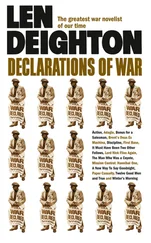Len Deighton - XPD
Здесь есть возможность читать онлайн «Len Deighton - XPD» — ознакомительный отрывок электронной книги совершенно бесплатно, а после прочтения отрывка купить полную версию. В некоторых случаях можно слушать аудио, скачать через торрент в формате fb2 и присутствует краткое содержание. Жанр: Триллер, на английском языке. Описание произведения, (предисловие) а так же отзывы посетителей доступны на портале библиотеки ЛибКат.
- Название:XPD
- Автор:
- Жанр:
- Год:неизвестен
- ISBN:нет данных
- Рейтинг книги:4 / 5. Голосов: 1
-
Избранное:Добавить в избранное
- Отзывы:
-
Ваша оценка:
- 80
- 1
- 2
- 3
- 4
- 5
XPD: краткое содержание, описание и аннотация
Предлагаем к чтению аннотацию, описание, краткое содержание или предисловие (зависит от того, что написал сам автор книги «XPD»). Если вы не нашли необходимую информацию о книге — напишите в комментариях, мы постараемся отыскать её.
XPD — читать онлайн ознакомительный отрывок
Ниже представлен текст книги, разбитый по страницам. Система сохранения места последней прочитанной страницы, позволяет с удобством читать онлайн бесплатно книгу «XPD», без необходимости каждый раз заново искать на чём Вы остановились. Поставьте закладку, и сможете в любой момент перейти на страницу, на которой закончили чтение.
Интервал:
Закладка:
‘Der Chef was wearing his usual plain grey, army-style jacket. But this day I noticed that there were stains on the lapel. You can’t imagine how amazing it was to see him in anything except carefully pressed, spotlessly clean clothes. I looked at his plain black trousers and civilian shoes but these were not up to his usual standard either.
‘The Führer was standing against a small table and I noticed that he put his weight against it, as if to steady himself. This confirmed the rumours I’d heard of a loss of balance and dizzy spells. Under his direction, Günsche was sorting the papers and documents into separate heaps. Against the wall there were half a dozen metal filing boxes painted dark green. FHQu was stencilled on each box, together with the word persönlich and a six-figure letter-number combination.’
Stuart almost shouted with excitement. What had looked like BBO on the box of Dr Morell’s papers was actually FHQu-Führerhauptquartier-and the shiny patch next to it was the place from which the word ‘personal’ had been removed.
‘The Führer smiled. I’m afraid my face must have registered my horror at his appearance. I stood transfixed, giving the Heil Hitler , arm upraised. But he did not respond to my salute.
‘ “Captain Wever,” he said. Even in those last days he hadn’t lost his trick of remembering names. But he lowered his eyes, and that surprised me, for he usually fixed his visitors with an unyielding stare that was almost hypnotic. I lowered my arm. He motioned his head impatiently, to indicate that I should not stand at attention. “I have an important task for you, Captain Wever.” He looked up and stared me straight in the eyes again. “A very important task.” I knew him well enough to understand that I was not expected to reply until asked a direct question. I said nothing. “The enemy is now using his heaviest weapons against me in Berlin.” I noticed particularly that he said “against me” as if it were a personal vendetta. “There are certain personal documents that I have decided should not be risked. And, in the interests of history, must not be destroyed. I have therefore decided that these documents-which I have personally selected for this purpose… ” Hitler indicated some piles of papers which were separated from the others, “should be put into safekeeping for future generations. It is a great trust that I place into your hands, Captain Wever.”
‘ “Yes, my Führer.”
‘ “Günsche will provide you with all the necessary paperwork that will ensure you cooperation from the Reichspost, the Reichsbahn, the armed forces and my SS. You will leave Berlin tonight, using my train.”
‘ “The Führersonderzug, my Führer?”
‘Hitler nodded. “To Frankfurt am Main. There will be cars and an armed escort there to take you onwards. Your exact orders and subsequent destination will be given to you later; you will unseal them on the train. You will use the train’s communications to keep me informed of progress-the necessary codes and ciphers will be included in your orders-and if the train is stopped or delayed by enemy action you can call upon whatever resources you require from the appropriate authority. Is that clear, Captain Wever?”
‘ “Yes, my Führer.”
‘And there it was,’ said Wever with a self-deprecatory smile. ‘That was my grand meeting with the twentieth-century Napoleon, and what had I contributed: “Yes, my Führer”, repeated over and over again. It was like that with all the people who met him: generals, admirals, inventors, U-boat captains, kings and presidents. He had you in the palm of his hand, and yet you came out of the study thinking that you’d just persuaded a highly intelligent man to do something you’d been planning all your life. That’s how it was with those damned papers.’
‘So you went back to the train as its sole passenger?’ Stuart asked.
‘You don’t understand the devious nature of the higher command,’ said Wever. ‘Hitler had instructed Günsche to prepare my movement orders and documentation. The SS sturmbannführer did it in consultation with Kaltenbrunner, head of the RSHA, who ran the Gestapo, the Kripo and Sicherheitsdienst: one of the most powerful people in the Third Reich. Not the sort of man who would let an army captain take personal charge of top-secret papers, just because the Führer had decided that the mission required a highly experienced communications expert.’
‘He flouted Hitler’s orders?’
‘Not at all. He provided an SS officer to accompany me. The orders instructed the Reichsbahn and the Reichspost officials-“in the name of the Führer” rather than the more usual “in the name of the Reich”-to provide the SS officer with facilities required, so that Captain Wever and his “special baggage” could be transported. The wording of those orders ensured that my role was little more than a baggage porter. It was the SS that would call the tune.’
‘Who was the SS officer who went with you?’
‘Oh, don’t misunderstand me,’ said Wever. ‘This Leibstandarte officer was an old friend of mine. It wasn’t the rank and file who were wasting valuable time in these ridiculous power-plays and devious games; we knew the end was near… He was only a junior rank-Obersturmführer, like a first lieutenant-but he was an old time regular. He’d been through the peacetime SS Junkerschule at Bad Tölz, and that was no picnic. I’d known Breslow since childhood, he was a decent man.’ Wever smiled at another recollection. ‘You can imagine that I wanted to visit my parents before we journeyed south. The way things were going with the Allies and the Russians so close, I had the feeling that I might never see the old people again. My home was near Tietz department store; I could be there in five minutes. I got out using my day pass but ran into the guard commander when I returned. He was a pig. He kept me in the guard room and phoned the military police. Luckily, Max Breslow came to my aid. He got one of the SS adjutants to straighten it out… but it was a narrow squeak for me, and I owe my thanks to Breslow. I could have been shot.’ Wever drummed his fingers on the table. ‘Did you ever try to give up smoking, Mr Stuart?’
‘Frequently.’
Wever pushed his hands deep into his pockets as if to punish them for drumming on the table. ‘Breslow was practical. When we departed he had brought two pistols-he knew I didn’t have one-and was wearing an MP 40 on his shoulder. He was right, of course-how could we have undertaken that sort of responsibility without guns? He had put a Führerhauptquartier cuff-band on his sleeve too. I was surprised-almost everyone had ceased wearing them long before-but Breslow said it would impress the country yokels. You see,’ Wever added, ‘Breslow was a Berliner.’ His tone of voice suggested that this accolade explained everything. Stuart had known many Berliners, and liked the distinctive sort of roguish wit- Schalkheit- that the city seemed to beget. But Berliners were not renowned for modesty or simplicity. How much of Wever’s story was window dressing, designed to hide something else? ‘The family lived in a big house in Pankow, his father was Georg Breslow, the actor, a famous man in Germany. He was the one who anglicized the family name. Breslow’s mother had been a soprano with the Berlin State Opera.’ Wever reached into his pocket for a tin, tapped it on the table and then put it back into his pocket again.
‘Yes,’ said Wever. ‘Breslow was wearing his Führerhauptquartier cuff-band. I was wearing a reversible winter camouflage jacket. It was a combat soldier’s garment. I’d never been anywhere near the front line, and that bothered me, so I wanted to wear that jacket and look like a fighting man. Even so, Breslow, in his battered leather overcoat, and an old peaked mountain cap crushed on his head, looked more like a fighting man than I ever could.’
Читать дальшеИнтервал:
Закладка:
Похожие книги на «XPD»
Представляем Вашему вниманию похожие книги на «XPD» списком для выбора. Мы отобрали схожую по названию и смыслу литературу в надежде предоставить читателям больше вариантов отыскать новые, интересные, ещё непрочитанные произведения.
Обсуждение, отзывы о книге «XPD» и просто собственные мнения читателей. Оставьте ваши комментарии, напишите, что Вы думаете о произведении, его смысле или главных героях. Укажите что конкретно понравилось, а что нет, и почему Вы так считаете.












